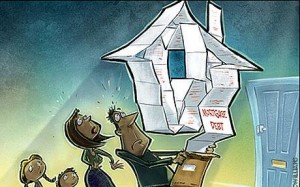
It has been a decent year for property it is fair to say. Yes, there have been better but equally there have been worse.
A new problem awaits in 2013 though and it has very little to do with property taxes or a lack of mortgage lending.
Yes, they will have their own impact on the market but the biggest worry at the moment has to be in relation to the number of people who are falling into arrears on their mortgages.
Figures released yesterday show that 86,000 or 11% of homeloans in the country are now more than 90 days in arrears.
That figure has risen by 5,000 from the previous quarter and with Budget cuts and the new property tax on the way it doesn’t look like easing any time soon.
To top matters off the government will shortly be removing a legal loophole, which up until now had halted banks from carrying out mass repossessions of properties.
The government has given a commitment to the Troika that this will be sorted by March and yesterday Tanaiste Eamon Gilmore reaffirmed that vow when he said it was very much on the agenda for the first half of the year.
First in the firing line of banks in terms of repossessions are buy-to-let investors who are in arrears. There are more than 26,000 of these, accounting for 17.9% of the overall total.
Recently a home was repossessed in the North East of the country where a mortgage of around €200,000 was owed. That same property went on the market this week for just €40,000 as the bank seeks to recoup some of its losses.
That shows that banks are becoming more ruthless as they desperately seek finance to help steady their own balance sheets.
Up until now repossessions have been few and far between but banks will get more ruthless, particularly when a change in legislation allows them to be more heavy-handed in their approach.
The mortgage arrears problem is one that is not going away but unfortunately there has been little done to sort it out up until now.
As well as those in long-term arrears a further 81,683 residential mortgage accounts have also been restructured up to the end of September.
With people’s finances constantly dwindling though, the hope of these people ever getting back to ‘normal’ repayments seems unlikely and if ECB interest rates were to rise next year the problem would only get worse.
The government can’t keep burying its head in the sand in relation to this problem and hope it goes away.
If it is let linger, the problem will only grow worse with banks likely to be even more keen to carry out repossessions if and when property prices start to rise again.
Is there any light at the end of the tunnel?
It is hard to see it at the moment, even though personal insolvency legislation is on its way.
Yes, 2012 hasn’t been a bad year for property but only for those in a position to move. For the thousands in arrears at present, many can only dream of being able to participate in the market again and move to a place more suited to their current situation.
Unless the arrears issue is dealt with that will remain just a dream and the larger economy will continue to suffer as a result





